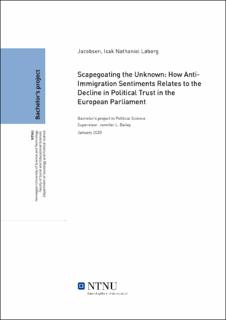| dc.description.abstract | A much debated question since the founding of the European Union (EU) has been the different scopes of european integration and conflicting national and European identities. For hundreds of years, nationality and nation-states have been fundamental sources of self-identification in Europe. More recently, however, the EU has contributed to creating a new source of self-identification (Stockemer, Niemann, Doris & Speyer, 2019; Kroskrity, 1999). A fundamental change in the 2019 European Parliament (EP) election was the increased MEPs of both green and nationalist populist party politics in Europe and within the EP, where the nationalist party Identity & Democracy gained 37 seats; making scholars note an already apparent rise of far right wing populist and nationalist parties in Europe (Mudde, 2019. p. 23). Previous academic work has since then noted a rise of anti-immigration attitudes in party politics in Europe. Immigration has in the last five years been a first priority concern for most of the EU member states that voted in the EP elections in 2019, according to the Eurobarometer 89, conducted by the European Commission (European Commision, 2018). Nationalist parties are, more than often, documented for their politicizing of the immigration question, scapegoating immigrants to secure the vote. In light of these documented changes in the political landscape in Europe, this paper aims to analyse the relationship between European citizens concerns about immigration and its effect on their trust in the EP as a political institution.
Scholars have argued for a number of years that political trust is in a decline (Hetherington, 2005; Torcal, 2014). While a growing body of academic literature debates the concept of political trust and its effect on democratic institutions, some earlier work has focused on the effects (and possible consequences) of a decline in political trust in national governments and national politics. I wish to expand this to the EU, a supranational regional actor that directly affect policy decisions in its member states. Specifically, this study aims to analyse if attitudes towards immigration have an effect on political trust in the EU’s only democratically elected institution, the EP. Interest in the relationship between concerns about immigration and declining political trust in the EU stems from a study conducted by Lauren McLaren (2011) delving into this relationship in Britain, arguing that the deep entrenchment of national identity and how it makes individuals relate to concerns about perceived threat of immigration affects our trust in the political institutions that govern us. If scholars are noting a decline in political trust and a rise in anti-immigration attitudes in nation states, this sentiment is hypothesized to be taking place in attitudes towards political trust in the European Parliament as well. The EU offers another scope of the role of identity, juggling between the relevance of national identity and integration of a european identity. By analyzing recent data collected from the European Social Survey 7 & European Social Survey 9, I aim to discuss the effect concerns about immigration has on political trust in the EP on European countries in contemporary time, and see if this plausible relationship has changed in the most recent EP election cycles. I aim to discuss, based on the empirical data and survey data presented in this paper, the following research question: “Does a rise in anti-immigration sentiments across Europe decrease political trust in the European Parliament?” | |
